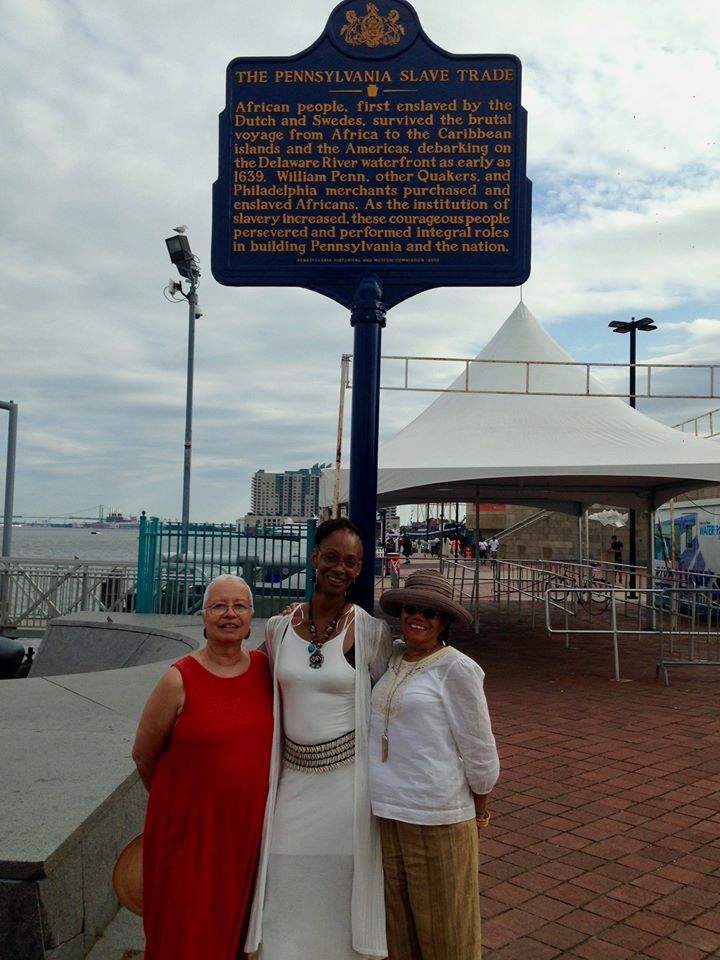MPCPMP continues the Wednesday series that highlights historic Middle Passage/UNESCO Site of Memory markers that have been installed and those locations where a remembrance ceremony was held since MPCPMP incorporated 9 years ago. MPCPMP is/was involved in the planning for the installation of most of these markers (indicated by an * next to the state name); other organizations are/were responsible for some.
Pennsylvania*
Africans first arrived in Pennsylvania with the Dutch and Swedish settlers who colonized the area in 1639. In 1667, the English took control of the colony, and in 1681, Charles II of England granted the Province of Pennsylvania to William Penn to settle a debt the king owed to Penn’s father. Penn, a Quaker, established the colony as a place of religious freedom for members of the sect, a refuge for those facing persecution in England. Although Quakers opposed the institution of slavery, Penn himself held Africans in bondage, referring to them in his letters and his will.
Research shows that in 1684 the first ship arrived at Philadelphia (established in 1682 as the capital of the Pennsylvania colony). By the early 1700s, “race-based slavery had developed and European colonists rationalized slavery by seeing Africans as barbaric, heathen, and therefore eligible for enslavement.” At that time, Africans in bondage made up almost twenty percent of the city’s population. Serving as a major mid-Atlantic commercial and shipping center, the city of “Brotherly Love” supplied enslaved Africans locally and to neighboring states – Delaware and New Jersey. By 1730 “about 4,000 slaves had been brought to Pennsylvania . . . most of them owned by English, Welsh, and Scotch-Irish colonists.” Like all the other colonies, the enslaved in Pennsylvania faced physical force, harsh punishment, violence, and strict regulations that limited their movement.
Although opposition to government-sanctioned servitude grew in the colony (by Quakers and non-Quakers allies), so did the institution of slavery. Even the Quakers “continued to hold slaves throughout the colonial period as few believed the practice immoral as long as owners treated their slaves fairly and without violence.” It was not until 1776, at the Philadelphia Yearly Meeting, that members were banned from holding people in bondage; those who refused faced exclusion from the Society of Friends.
During the American Revolution, as the nation’s founders formally agreed upon and adopted national ideals (1776) at Independence Hall, discussions about abolition continued, and the very language used to support the war for freedom from the tyranny of England was used to protest the institution of slavery, highlighting “the hypocrisy of owning slaves amidst a crusade for freedom,” comparing the denial of human rights and brutality against the enslaved to the efforts by the British to subjugate the colonies. This resulted in the Gradual Abolition Act of 1780 that, in actuality, did not make slavery illegal immediately but instead endorsed the eventual freedom of those born into slavery, stating that “even though the children born were not ‘slaves’, they are required to remain in the service of their owners as a type of indentured servant or apprentice until that child is 28 years old.” Although Pennsylvania was the first of the states to abolish slavery, the practice of slavery was not completely eliminated from Pennsylvania until 1847.
On August 5, 2016, the Philadelphia Middle Passage Ceremonies and Port Markers Project, led by Denise Valentine (now deceased) installed a marker to honor African ancestors and their descendants whose unpaid labor was integral to building the colony/state. Please follow these links to read more about Pennsylvania and slavery and find resources for additional information: http://www.phmc.state.pa.us/…/pa-histo…/index.html:1681-1776: The Quaker Province
https://philadelphiaencyclopedia.org/: Slavery and the Slave Trade
https://revolutionary-war.net/the-act-for-the-gradual-abol…/

Photo Credit: Denise Valentine

Denise passed away in March 2020. She was Philadelphia. Her dedication, enthusiasm, activism, and talent focused on caring for her family, promoting an accurate inclusive history of Philadelphia, storytelling, and community organizing. She worked almost single-handedly for many years to install the Middle Passage marker dedicated in 2016. Coordinating an annual commemoration for African ancestors each June at Penn’s Landing on the pier adjacent to Independence Seaport Museum was a trademark that reflected her spirit and pride in African American culture.

